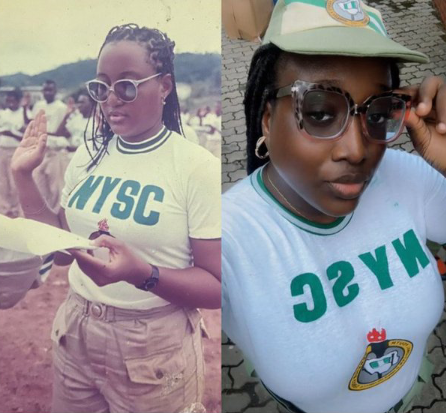
Double Vision: Lady Stuns Social Media with Throwback of Her Mom in NYSC Uniform Beside Hers

In a world where social media thrives on surprises, nostalgia, and moments that tug at the heartstrings, one young lady has set the internet abuzz after sharing a side-by-side throwback of herself and her mother in their respective National Youth Service Corps (NYSC) uniforms. The photo, which has been circulating rapidly across multiple platforms, has left many in disbelief, sparking debates, admiration, and a flood of emotional reactions as people marvel at the striking resemblance and the weight of history captured in just two frames. What seemed like a simple throwback quickly morphed into a viral sensation, capturing the attention of Nigerians both at home and abroad who could not resist the rare blend of beauty, legacy, and culture the images represented.
For those familiar with the NYSC, the khaki uniform is more than just fabric—it is a rite of passage, a national symbol, and a unifying force that has stood for decades as a bridge across ethnic, cultural, and social divides. Every graduate who dons the NYSC uniform steps into a tradition that millions before them have experienced, a phase of life that is usually remembered with nostalgia and pride. To see both mother and daughter separated by decades of history but linked by the same olive green attire is nothing short of extraordinary, and it explains why the post continues to trend as though it were breaking news.
The young lady, whose name has since been withheld from public disclosure to protect her privacy, had simply uploaded the two pictures on her social media page with a caption that read, “Like mother, like daughter. From one NYSC journey to another.” In her photo, she is seen standing tall in her freshly ironed khaki shirt and trousers, with her crested vest and jungle boots completing the ensemble, her smile radiant with the excitement and uncertainty that comes with service year. Beside her is the faded but equally striking image of her mother, decades earlier, in the exact same uniform style, her posture poised, her smile carrying the same youthful glow, and her aura unmistakably strong. The resemblance between the two is so uncanny that many netizens joked that it was like looking at the same person through the lens of time travel.
Almost immediately, the photo set off waves of comments, likes, and shares. Admirers flocked to her page, leaving remarks about genetics, beauty, and the resilience of Nigerian women. Some commented that the daughter was “her mother’s carbon copy,” while others marveled at how history had repeated itself so gracefully. Several users went as far as suggesting that the NYSC should consider using the side-by-side photo in its official campaigns, given how perfectly it represents continuity, unity, and national pride across generations. Within hours, hashtags like #LikeMotherLikeDaughter, #NYSCThrowback, and #LegacyInKhaki began trending, underscoring how the simple post had resonated deeply with Nigerians.
The fascination with the post did not only rest on the uncanny resemblance. For many Nigerians, it evoked powerful emotions tied to the NYSC experience itself. Stories began to pour in from older citizens who remembered their own service year with fondness and from younger Nigerians who looked forward to their turn. Comment sections became mini-reunions as people recounted their own tales of camp life, community service, friendships, and the bittersweet end of service year. The photo had inadvertently turned into a catalyst for national memory, reminding people of a system that, despite its challenges, continues to hold sentimental value in Nigerian society.
Sociologists and cultural commentators have weighed in, suggesting that the virality of the post is not surprising. They point out that Nigerians are deeply connected to symbols of legacy and continuity, especially when tied to family and national identity. The fact that the mother and daughter shared not only looks but also the same life milestone highlights the cyclical nature of human experiences, something that resonates universally. In a time where social media is often dominated by controversies and conflicts, this post offered a refreshing break—a wholesome story that everyone could connect with, regardless of political, ethnic, or religious differences.
The lady’s story also ignited conversations about the significance of NYSC in modern-day Nigeria. While some commenters used the opportunity to criticize the program, calling for reforms or outright cancellation due to challenges faced by corps members, others defended it, insisting that moments like this show why it must be preserved. “NYSC is bigger than just service—it’s tradition, memory, and unity,” one user wrote. Another added, “Seeing mother and daughter in the same uniform decades apart just proves the strength of the idea behind NYSC. It connects generations.”
As the post continues to spread, online communities have also begun creating artistic edits of the images. Graphic designers have blended the two photos into a single creative piece, while others have drawn digital portraits capturing the mother-daughter resemblance. Memes have also surfaced, with many humorously suggesting that the daughter’s children will one day continue the tradition, creating a generational collage of NYSC throwbacks. Some even went as far as predicting a future where artificial intelligence could create a full family lineage album of NYSC uniforms across generations.
What stands out most about this viral moment is how it highlights the quiet power of personal stories. In an era where people often assume that only celebrities or influencers can capture public attention, this lady’s heartfelt post proved otherwise. It reminded everyone that authenticity, family, and culture remain some of the strongest forces that connect people online. By sharing a simple yet profound comparison between herself and her mother, she tapped into something larger than herself—an entire nation’s shared experience of service, youth, and the passage of time.
Offline, the ripple effects of the post are also being felt. Communities are reportedly organizing their own “throwback challenges,” encouraging people to dig out old photos of their parents in uniforms, traditional attire, or even graduation gowns to compare with their present-day images. The trend is fast becoming a movement, further fueled by the emotions sparked by the lady’s viral post. It is a reminder that while technology connects us globally, it is stories like this that keep us grounded locally, rooted in our traditions, and appreciative of the paths paved by those before us.
As the story continues to make waves, one cannot help but reflect on the beauty of continuity and the quiet echoes of history that repeat themselves in families. The NYSC uniform may fade and fray over time, but the memories, legacies, and emotions it carries remain indelible. For one young lady and her mother, a single throwback photo has become more than just a family album entry—it has become a national talking point, a celebration of heritage, and a testament to the enduring spirit of Nigeria’s youth service program. In the end, perhaps that is the true magic of the post: it captured not just two women in khaki, but the story of a nation, its people, and the invisible thread of time that binds generations together.


